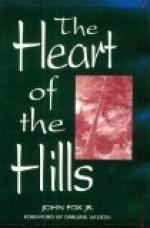His face was almost aglow when he drove out through the gate that morning on his way to the duties of his first day. The neighborhood children were already on their way to school, but they were mostly the children of tobacco tenants, and when he passed the school-house he saw a young woman on the porch—two facts that were significant. The neighborhood church was going, the neighborhood school was going, the man-teacher was gone—and he himself was perhaps the last of the line that started in coonskin caps and moccasins. The gentleman farmers who had made the land distinct and distinguished were renting their acres to tobacco tenants on shares and were moving to town to get back their negro servants and to provide their children with proper schooling. And those children of the gentle people, it seemed, were growing more and more indifferent to education and culture, and less and less marked by the gentle manners that were their birthright. And when he thought of the toll-gate war, the threatened political violence almost at hand, and the tobacco troubles which he knew must some day come, he wondered with a sick heart if a general decadence was not going on in the land for which he would have given his life in peace as readily as in war. In the mountains, according to St. Hilda, the people had awakened from a sleep of a hundred years. Lawlessness was on the decrease, the feud was disappearing, railroads were coming in, the hills were beginning to give up the wealth of their timber, iron, and coal. County schools were increasing, and the pathetic eagerness of mountain children to learn and the pathetic hardships they endured to get to school and to stay there made her heart bleed and his ache to help them. And in his own land, what a contrast! Three years before, the wedge of free silver had split the State in twain. Into this breach had sprung that new man with the new political method that threatened disaster to the commonwealth. To his supporters, he was the enemy of corporations, the friend of widows and orphans, the champion of the poor—this man; to his enemies, he was the most malign figure that had ever thrust head above the horizon of Kentucky politics—and so John Burnham regarded him; to both he was the autocrat, cold, exacting, imperious, and his election bill would make him as completely master of the commonwealth as Diaz in Mexico or Menelik in Abyssinia. The dazed people awoke and fought, but the autocrat had passed his bill. It was incredible, but could he enforce it? No one knew, but the midsummer convention for the nomination of governor came, and among the candidates he entered it, the last in public preference. But he carried that convention at the pistol’s point, came out the Democratic nominee, and now stood smilingly ready to face the most terrible political storm that had ever broken over Kentucky. The election was less than two months away, the State was seething as though on the trembling crisis of a civil war,




